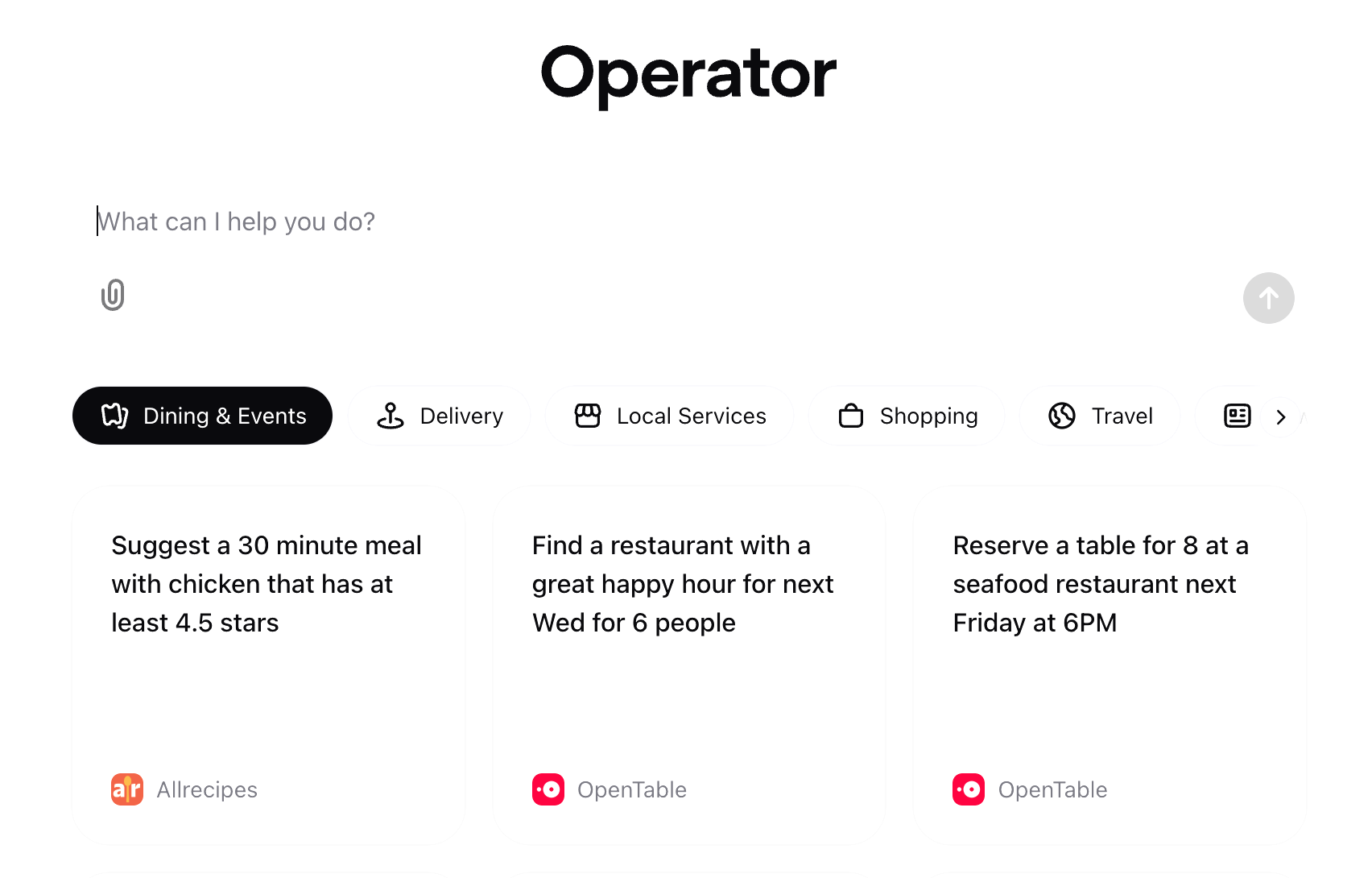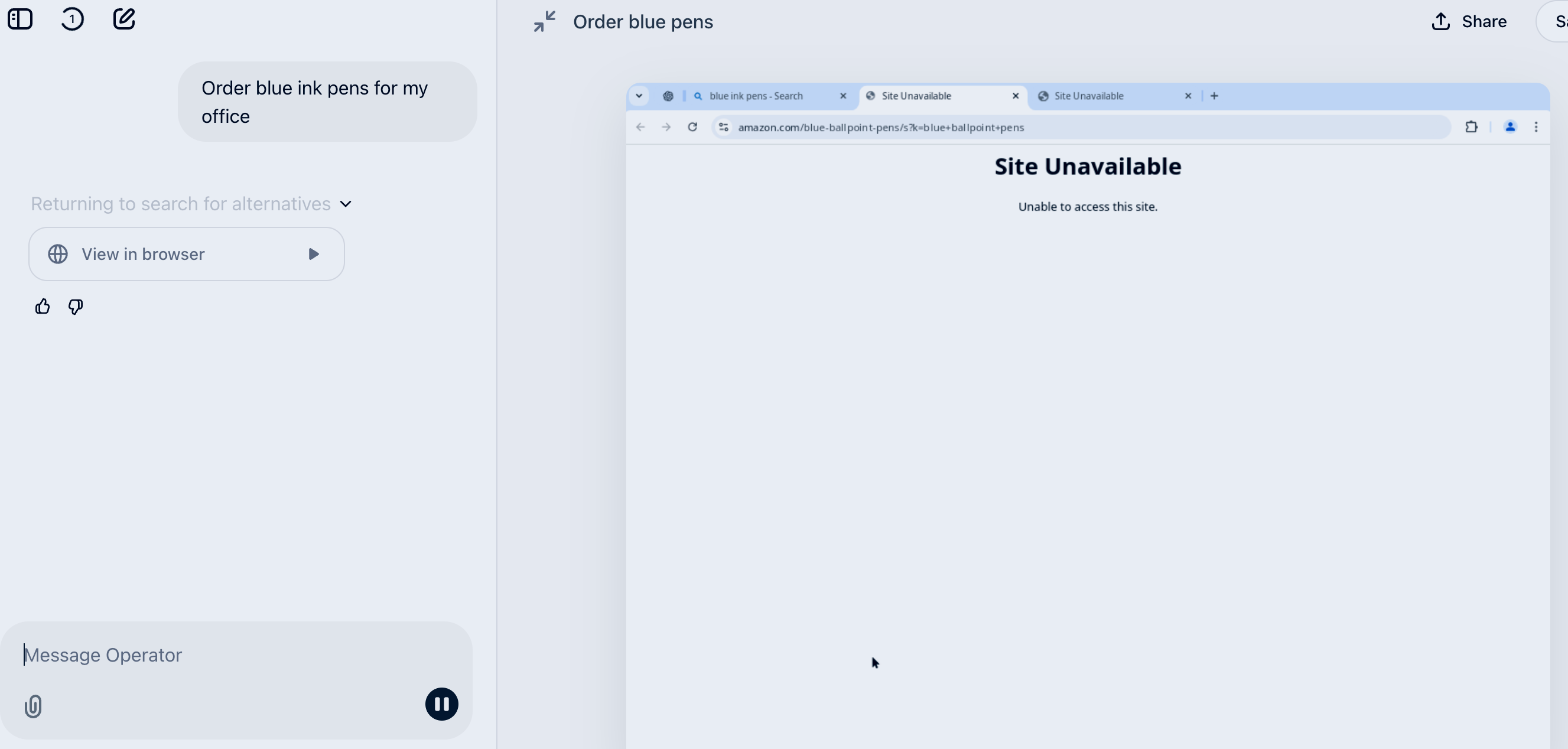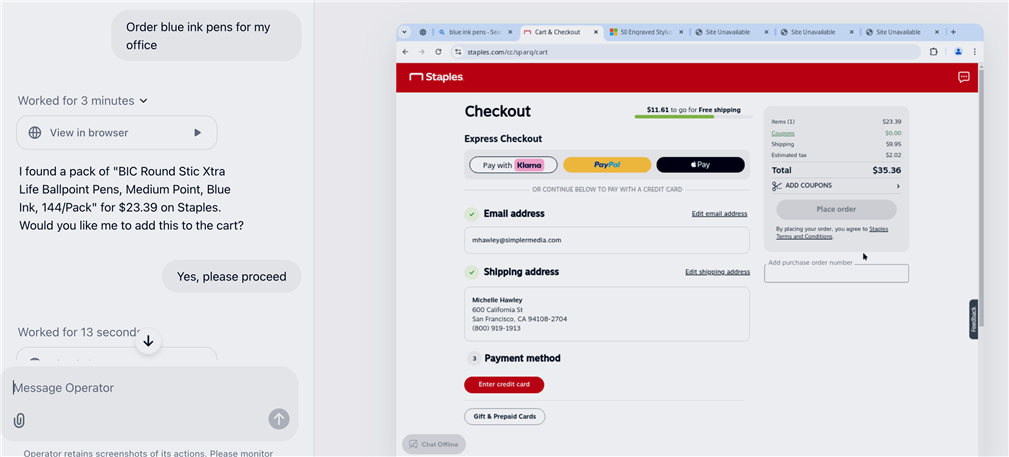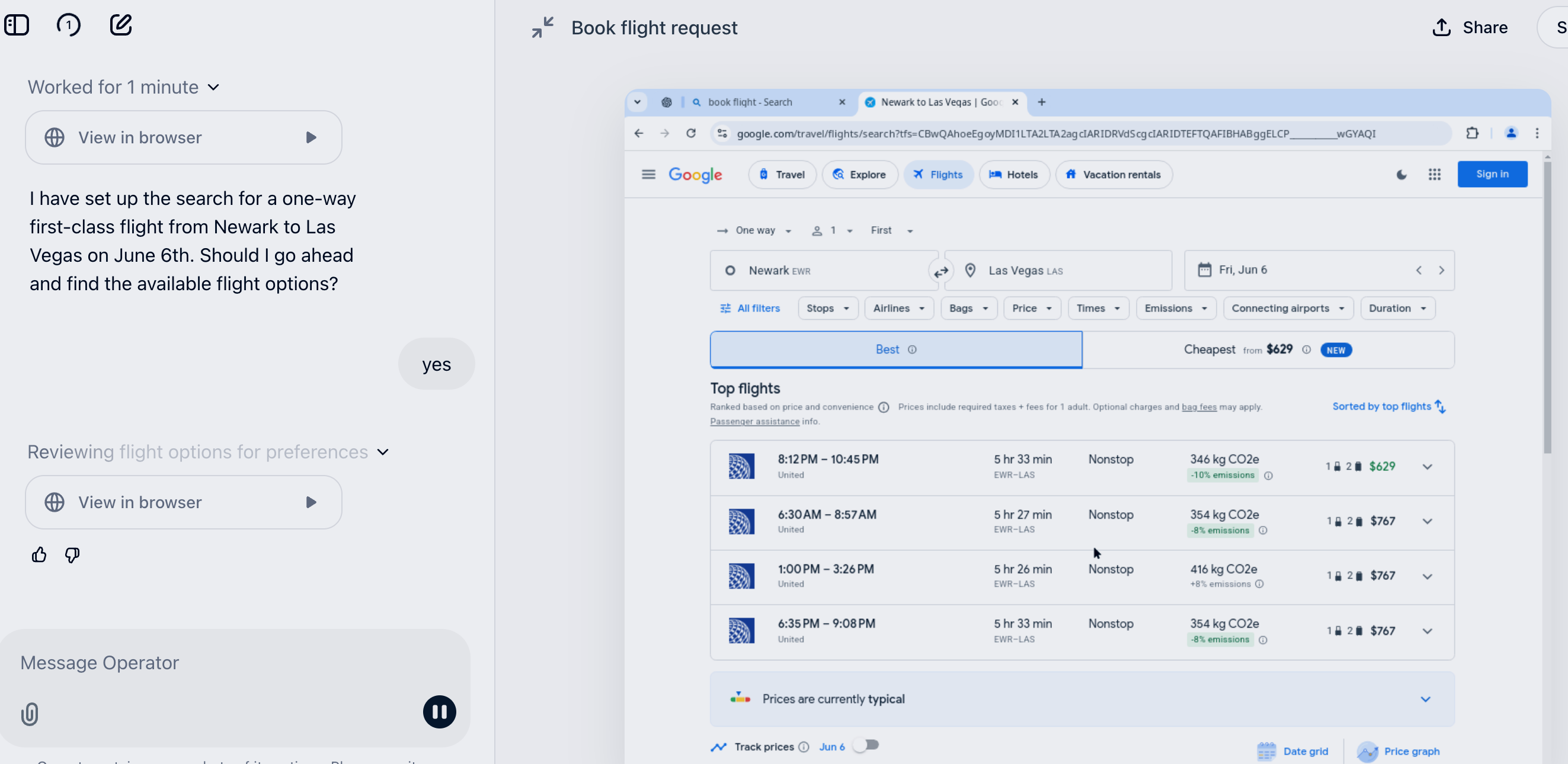OpenAI’s Operator is an AI agent that follows your every command (to the best of its ability). From automating email responses to booking the best flights to ordering office supplies, this AI agent can complete tasks on its own, without the need for you to supervise every step of the way.
What Is Operator, Exactly?
OpenAI’s Operator is an AI agent that can use its own browser to perform tasks for you. Unlike ChatGPT and other popular AI models, which can browse the web for information, Operator goes a step further, able to interact with web pages by clicking buttons, typing and scrolling.
If the AI agent makes a mistake or encounters difficulties, it can leverage its reasoning capabilities to self-correct. If the problem is too big and it can’t come up with a fix, it will hand control back over to the user.
Related Article: The CIO’s Guide to AI Agents: Balancing Risk With Innovation
How Does Operator Work?
Operator is powered by a model called Computer-Using Agent (CUA), which combines GPT-4o’s vision abilities with advanced reasoning through reinforcement learning, according to OpenAI. It’s trained to interact with buttons, menus and text fields that people would typically see on a webpage.
CUA is still in its early stages and, as such, has limitations and will evolve over time based on user feedback. There are also certain safeguards in place to prevent people from using it maliciously.
“I think we’re all very excited about this vision of Operator doing your chores for you, but it is one of the first agents that we’re putting out in the world, which has real-world side effects,” Casey Chu, a member of OpenAI’s computer using agent team, said in a demo.
The team has done a lot of work with ChatGPT to bring many of the same mitigations to Operator, he added. Moderation models are in place, as well as post-task detection and blocked websites. Plus, the AI agent will refuse harmful tasks, including harmful agentic tasks.
“It’s this stack of mitigations that each incrementally reduce the risk to the point where we feel comfortable deploying,” said Chu.
Getting Started With Operator: Who Can Use It and How
Operator is currently available to Pro users who are over 18 (and do not reside in the EU, Norway, Switzerland, Liechtenstein or Iceland). The plan currently costs $200 per month.
If you have access to the AI agent, all you have to do is describe the task you’d like done and let it handle the rest. Add custom instructions or limitations, set preferences for your favorite websites — or ones you want to blacklist — and save prompts that you plan to use again.
You can watch Operator as it browses the web and clicks through various pages, and you have the ability to take over control at any time. Plus, Operator can work on multiple tasks at the same time.
If the AI agent encounters a page where you need to log in, provide payment details or solve a CAPTCHA, it will ask you to take over.

Right now, Operator offers six categories of use cases right on its home screen:
- Dining & Events
- Delivery
- Local Services
- Shopping
- Travel
- News
Seymour Duncker, Executive Strategist of AI & ML at Decision Counsel, said he’s used Operator to try to find a beach resort in Mexico within a certain price range. However, he found that it didn’t replace the need to actually search himself.
“User experience still has a long way to go,” he said. When he entered his search criteria (a resort in Mexico for one week in June for three people), it picked random dates (Sunday the 8th to Monday the 9th) and came back with random locations.
“I would have expected it to ask a few more questions, like what exact dates I'm looking for, location options and preferences, etc. Like a travel agent would ask you a few questions before going off on a search.”
Business Use Cases for Operator
While Operator could be a great tool for everyday tasks — ordering groceries, scheduling a cab, making dinner reservations — its true value lies in how it can streamline operations and save time for business users.
Let’s take a look at some business use cases for Operator in action:
1. Shop for Software
If you’re in need of a certain type of software — a CRM, CDP, CMS, all the acronyms — you don’t have to dig through website after website looking for one that will fit your needs and budget. You can ask Operator to do the heavy lifting for you.
For instance, you can ask the agent to find you a data visualization tool that offers a tiered pricing model. Or a digital experience platform that comes with robust vendor support.
How Does It Work in Action?
I asked Operator to find me a CRM platform. I gave it the following specifications:
- It must have automation features
- It must offer task and activity management to assign, track and manage tasks
- It must integrate with Gmail, Marketo and SAP
- It must be scalable
- It must comply with GDPR, CCPA and other compliance standards
Operator started its search on a “best CRMs” listicle. From there, it looked at the specs for each platform before going to a specific platform’s website — in this case, Salesforce.
On the Salesforce site, the AI agent looked through the company’s product offerings and eventually examined the CRM’s capabilities. It even searches the site to find more information on Gmail and Marketo integrations. When Operator does not find all of its integration answers on the Salesforce website, it goes back to Bing to find more information.
Eventually, it comes back to me with the answer: Salesforce CRM.
Because I watched Operator’s entire process, I don’t need to verify that the platform includes all of my requirements. However, if you choose to let Operator do its thing and come back later, it would be a good idea to double check the results.
2. Order Deliveries
Operator has the ability to order certain items for delivery. In this case, you could ask it to order blue ink pens (or other office supplies) every four weeks from a specific website. If you’re feeling generous, you could also use it to order lunch for the whole office from a local sub shop.
How Does It Work in Action?
I tried ordering blue ink pens with Operator. Interestingly enough, when the tool tried to access a page on Amazon (which it attempted several times), it was blocked.

However, the agent persisted, and soon scrolled through all of the offerings on Staples.com. It used various on-site filters, like brand (it chose BIC) and ink color to shorten the list of results.

Eventually, Operator notified me that it found a pack of 144 blue pens for $23.39 and asked if I’d like to add it to my cart — to which I told it yes. From there, it continued the checkout process (selecting “checkout as guest” instead of asking me to sign in) and asking for details like my email address (it thoughtfully opted me out of marketing emails), shipping address and phone number.
Once it was time to enter the payment details, Operator asked me to take over and complete the purchase.
3. Book Business Travel
Operator can book various reservations, ideal for when you’re planning a business trip but don’t have time to figure out the small details.
The agent can book flights, reserve a hotel room, make restaurant reservations and buy tickets to events. Ask it to look for the best prices, filter out hotels rated at less than four stars, find hidden-gem restaurants frequented by locals and much more.
How Does It Work in Action?
I started by asking Operator to make a reservation at an Italian restaurant for Saturday at 8pm. Upon prompting, I provided it with my ZIP code. The tool did a great job looking through various Italian restaurants and finding one with that open reservation time. The problem, however, is it was looking in the wrong location.
For that first test, I used Operator’s “Dining and Events” category. I decided to try it again with the “Travel” category.
Attempt #2
This time, it searched the right location. After ruling out Olive Garden due to lack of online reservations, it chose a local Italian restaurant and attempted to click on the site’s “Call for Reservations” link, but was blocked from the page. It did try three times, though.
Operator made a few more attempts to complete this request, but unfortunately for it, this may have been impossible — almost no restaurant in my area offers online reservations, and Italian restaurants are few and far between. It did come back to me with two alternatives, though — one local American eatery and Red Lobster.
Attempt #3
Next, I asked Operator to book me a flight from Newark to Las Vegas on June 6th, specifying that I wanted to fly first class. It searched with the right filters on Google.

Once I confirmed I wanted to book, it navigated to the United website and asked for various personal information to check out. Once it came time to enter payment details, Operator handed over control to me.
Attempt #4
In one last test, I asked the tool to book me a hotel room in Las Vegas for August 8th at a hotel that’s on the Las Vegas strip.
First, it used a map to get the lay of the land. Then it took to Microsoft Bing Travel to search for hotels in that location and on that date. Eventually it chose Treasure Island (not my first pick, but it did follow directions).
When it got to the actual booking process, Operator asked if I wanted to provide my personal details. When I told it “yes,” it asked me to take control.
Other Business Use Cases
Other great business use cases for Operator requiring a bit more setup include:
- Have Operator organize and prioritize your emails
- Use Operator to automatically handle refund requests
- Allow Operator to schedule customer reservations
- Use Operator to manage order modification requests from customers
- Have Operator create a shortlist of the most qualified candidates for a job (and schedule interviews)
- Task Operator with monitoring competitors for things like product pricing, availability and new trends
Ultimately, however, Dunkler expressed uncertainty on the tool’s overall performance. “My sense is where you have clarity of what you want, there is a lack of trust in whether it will execute properly (e.g., go order my coffee bean refill), and does it really save time over going to Amazon and doing the 1-click purchase?”
When you’re not sure what you’re looking for, he added, it doesn’t do a great job in helping you get more clarity — something, he added, that should be ChatGPT’s superpower. “If it is improved, I could see a lot of value.”
Related Article: The AI Agent Explosion: Unexpected Challenges Just Over the Horizon
What’s Next for Operator? OpenAI’s Future Plans
OpenAI plans to expand Operator access to Plus, Team and Enterprise users in the future, as well as integrate these capabilities into ChatGPT. The tool will also be available to other countries “soon,” Altman said in that same demonstration — though, he added, “Europe will take a while.”
The AI company is also reportedly planning to release a Ph.D.-level AI agent specifically targeting enterprise clients. The most advanced model of this agent could cost up to $20,000 per month, with a lower-tiered version available at $2,000 per month.
Dunkler, who’s a product builder, said he’s interested in potential Operator API access — something that’s not available yet.
As more companies enter the AI Agent game (like the new Chinese AI Agent, Manus), OpenAI will have to move quickly, offering a useful and trustworthy product that can capture a significant share of the market.
